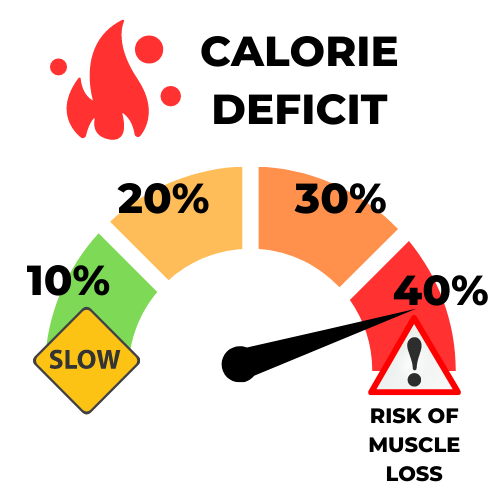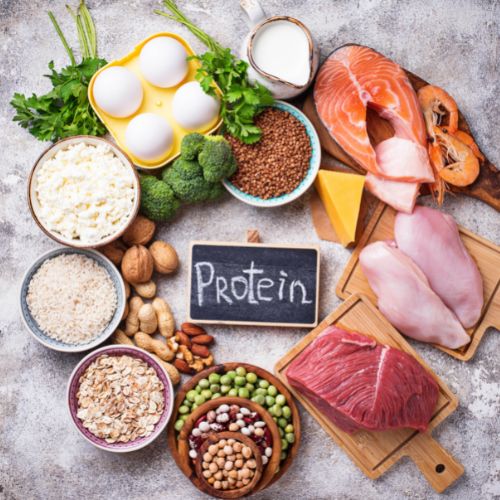
Wanting to preserve muscle mass?
Losing fat can be a challenging task, and it becomes even more difficult when you want to retain your muscle mass while shedding the extra pounds. Muscle mass is essential for good health, as it increases metabolism, supports posture, and provides strength for daily activities.
Losing muscle mass can result in a decrease in metabolism, leading to a slowdown in weight loss progress.
Fortunately, there are several ways you can preserve your muscle mass while losing fat.
In this article, we will explore the factors that impact muscle mass during fat loss and discuss the literature that supports them.

When you are trying to lose fat, it is common to reduce your calorie intake. However, if the calorie deficit is too large, it can negatively affect your muscle mass.
A large calorie deficit can cause the body to use muscle tissue as an energy source, leading to muscle loss.
To prevent this, it is important to maintain a moderate calorie deficit and avoid extreme diets that drastically reduce calorie intake.
A 20-30% reduction from your maintaince calories should be sufficent.

The types of exercises you do can also impact muscle mass during fat loss. Resistance training, also known as weightlifting, is an effective way to preserve muscle mass. It stimulates muscle growth and helps maintain muscle mass during weight loss.
Cardiovascular exercise, on the other hand, does not directly preserve muscle mass but can help with fat loss and overall health.
Cardio should not be your PRIMARY form of exercise if your goal of a fat loss phase is to also retain muscle mass. Infact, too much cardio may negatively effect lean mass / muscle retention during a fat loss

Summary: Cardio should be limited to less than 30% of your exercise schedule and mostly be used as a method to burn extra calories.
Protein is crucial for building and repairing muscle tissue. When you are in a calorie deficit, it is even more important to consume enough protein to preserve muscle mass.
A general rule of thumb is to consume around 2 grams of protein per kilo of body weight per day.
This will provide your body with enough protein to support muscle growth and repair.

Getting enough sleep is essential for muscle recovery and growth. During sleep, the body repairs damaged muscle tissue and releases hormones that support muscle growth. Lack of sleep can negatively impact muscle recovery and growth, leading to muscle loss. Various studies have shown that sleep deprivation during a fat loss period can actually increase the amount of lean mass (and muscle) lost.
Summary: Those who get higher quality sleep will retain more muscle mass / lean mass than those who’s sleep is low quality.

Research shows that resistance training is an effective way to preserve muscle mass during fat loss. Participants who engaged in resistance training while on a calorie deficit maintain more or their muscle mass while losing fat than those who do not do resistance training.
The data is very clear, various study suggests that incorporating resistance training into your weight loss program will help you retain muscle mass.

Majority of people will lose a bit of lean mass weight during a weight loss. Some of this is from the decreases in carb intake, which also increases water retention within the body as carbs attract water. So, saying that, some lean mass will appear to fade but then it will return when transitioning to maintainece calories. Accurately measuring the lean mass loss can be difficult, but followng the guidelines in this post will help with establishing the guiderails for your transformation.
Its generally recommend you lose weight no faster than 0.5–1% of your body weight per week. The fatter you are, the higher you can goin that range. The leaner you are, the closer to 0.5% you should be.
That said, even if you can get away with losing weight at 1% of your body weight per week, it may not be best to attempt to do so if you also want to preserve lean mass / muscle mass.
Small / Very Lean = 0.5-0.75% body weight per week (perhaps -0.3-0.6kg per week)
Most people = Around 0.75-1% body weight per week (perhaps 0.5-1kg per week)
Overweight / Obese = More than 1% of body weight per week (perhaps 0.8-1.3 kg per week)
This is generally not recommended, as sustainable progress will be the best way to ensure you get to your target weight. That being said, sometime the psychological benefit for ‘getting in shape’ for the individual is a valid goal, and rebuilding after (if done correctly) can be relatively simple.
There are risks:
However, some folk just wat to get the job done (or they are trying to win a challenge). If this is you, be sure you apply as many of the principles in this post as possible. Also be sure you:
Losing fat while preserving muscle mass is achievable with the right approach. Maintaining a moderate calorie deficit, incorporating resistance training into your program, consuming enough protein, and getting enough sleep can all help preserve muscle mass. By following these guidelines and implementing them into your weight loss program, you can achieve your fat loss goals while retaining your muscle mass.
Fuel your potential with healthy nutrition. Found My Physique’s goal is to help make amazing body transformations easy, using proven nutrition and training protocols.

